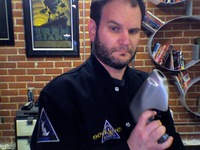Book marketer/publicist Michael R. Drew has put together a site called beneaththecover.com under the guise of helping aspiring writers with expert advice…except all the "advice" is coming from publicists and self-publishers looking to sell their services to the unwary.
In an apparent bid to legitimize their effort, they have been reaching out to "hundreds" of authors, hoping to convince them to provide free content to the site. I’m one of the authors they contacted. Lehi Drew wrote, in part:
Just wanted to let you know about our trend-setting website. And I’m
hoping you’ll like it enough to accept our invitation to become a
contributor. You see, I’ve seen your blog site,A Writer’s Life, and I
think you’re a great writer..
Our website is dedicated to professionals of the book industry, and it’s called Beneath the Cover (www.beneaththecover.com). It also has an associated blog site, Push the Key (www.pushthekey.com).
What’s in it for you? As a contributor, your name and blog site will be
constantly seen by hundreds and even thousands of book industry
visitors every day. At our site, we draw people from every level of the
book industry, including authors, writers, marketers, publishers,
editors, and agents.
Your Articles. As visitors see your articles on a regular basis and
enjoy your style and the substance of your expertise, they’ll become
familiar with your writing, your expert reputation, and your marketing
platform.
Wouldn’t it be great if you sent a manuscript to a publisher or an
agent and they responded with, “I’m familiar with your work on Beneath
the Cover, so I took the time to go over your manuscript. Let’s talk.”
Wow!
Wouldn’t be great if a publisher got my manuscript and said "Lee is so damn witty and good looking, we’ll give him a $1 million contract without reading a word!" That’s about as likely to happen as the ridiculous fantasy Beneath the Cover is trying to entice me with. I ignored Lehi’s email. So, a week later, she tried again.
First, let me reassure you that this is not part
of a mass mailing from a list of names/sites that I bought or got from
someone else. I AM mailing to hundreds of writers like yourself, but I’ve been to each site personally.
So, it’s not a mass mailing, but they ARE contacting hundreds of writers. Hmmm. She went on to say:
You,
obviously, have had a lot of experience writing. I can see that, not
only by the fact that you’ve done screenwriting, but by the number of
books you have listed on your blog. I am confident that this shows that
you have great insight into how the book industry works.
I would very much like for you to become a weekly contributor to Beneath the Cover. I
think that because you’re an experienced author, that you would have
advice for other authors trying to get published and writing. I really
think that, plus your knowledge of the industry, would make you a good
fit with us and our other contributors.
I responded that if she really read my blog, she’d know that I wouldn’t be the least bit interested in lending my time, effort, or good name to help them sell promotional and self-publishing services to writers under the guise of offering "advice." In fact, if anything, my advice would be to avoid their site. I also said:
Your site is an outgrowth of Michael Drew’s book promotion business and, not surprisingly, the majority of your contributors come from the self-publishing industry or are selling book promotion & marketing services…
which creates a real conflict-of-interest when it comes to the "advice"
they are giving.
Your contributors have something to sell, and so does
Drew. The only thing that I or any other published author would be
doing by contributing to your site would be lending our credibility to your underlying effort to advance the promotional and
self-publishing services your experts are selling.
I don’t see any published authors among their experts, so it looks like their "not a mass mailing" to hundreds of authors hasn’t worked. I guess real authors are a lot smarter than the hucksters think we are.
UPDATE: They also contacted my brother Tod, asking him to contribute to their site. He asked them what they pay…and they said not a dime because "Beneath the Cover is a cooperative venture for building marketing platforms of everyone involved." At least they were honest with him about their real motives (though it’s pretty obvious to anyone who visits their site). I’m surprised they haven’t brought in Lori Prokop or the experts over at Airleaf as contributors yet…








